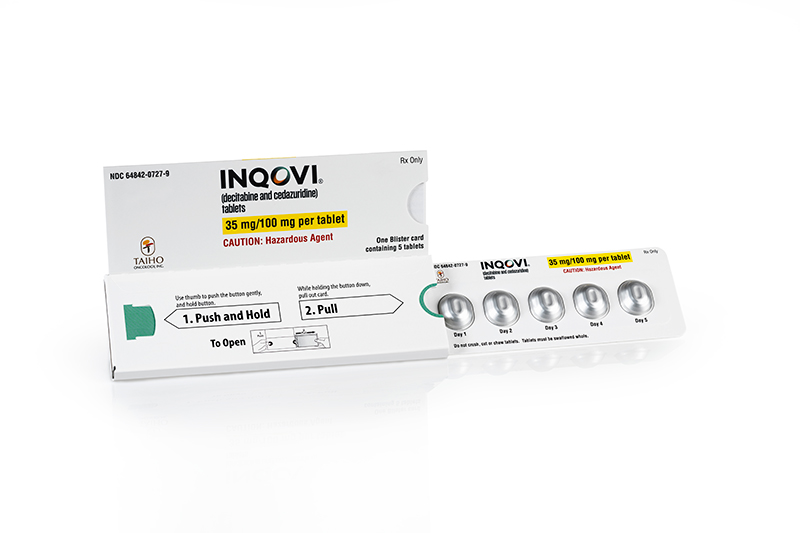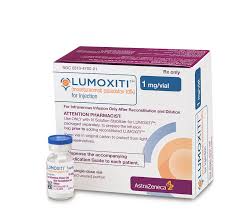Inqovi (decitabine and cedazuridine) vs Lumoxiti (moxetumomab pasudotox)
Inqovi (decitabine and cedazuridine) vs Lumoxiti (moxetumomab pasudotox)
Inqovi (decitabine and cedazuridine) is an oral hypomethylating agent used for the treatment of adults with myelodysplastic syndromes (MDS), including certain types of chronic myelomonocytic leukemia (CMML). Lumoxiti (moxetumomab pasudotox) is an intravenous CD22-directed cytotoxin indicated for the treatment of adult patients with relapsed or refractory hairy cell leukemia. The choice between Inqovi and Lumoxiti would depend on the specific type of blood cancer a patient has, as they are approved for different conditions and have distinct mechanisms of action.
Difference between Inqovi and Lumoxiti
| Metric | Inqovi (decitabine and cedazuridine) | Lumoxiti (moxetumomab pasudotox) |
|---|---|---|
| Generic name | Decitabine and cedazuridine | Moxetumomab pasudotox-tdfk |
| Indications | Myelodysplastic syndromes (MDS) | Hairy cell leukemia |
| Mechanism of action | Hypomethylating agent (decitabine) and cytidine deaminase inhibitor (cedazuridine) | CD22-directed cytotoxin |
| Brand names | Inqovi | Lumoxiti |
| Administrative route | Oral | Intravenous |
| Side effects | Fatigue, constipation, hemorrhage, myalgia, mucositis, arthralgia, nausea, dyspnea, diarrhea, rash, dizziness, febrile neutropenia, edema, headache, cough, decreased appetite, upper respiratory tract infection, pneumonia, and transaminase increased | Infusion reactions, edema, nausea, fatigue, headache, pyrexia, constipation, anemia, and diarrhea |
| Contraindications | Known hypersensitivity to decitabine or cedazuridine | Known hypersensitivity to moxetumomab pasudotox or any of its components |
| Drug class | Hypomethylating agent | Immunotoxin |
| Manufacturer | Taiho Oncology | AstraZeneca |
Efficacy
Inqovi (decitabine and cedazuridine) Efficacy in Leukemia
Inqovi, a combination of decitabine and cedazuridine, is a medication approved for the treatment of adult patients with myelodysplastic syndromes (MDS), including previously treated and untreated, de novo and secondary MDS with the following French-American-British (FAB) subtypes: refractory anemia, refractory anemia with ringed sideroblasts, refractory anemia with excess blasts, and chronic myelomonocytic leukemia (CMML), as well as intermediate-1, intermediate-2, and high-risk International Prognostic Scoring System (IPSS) groups. MDS can be considered a type of leukemia, and Inqovi is used to treat these specific subtypes that are characterized by abnormal cells in the bone marrow that can lead to acute myeloid leukemia (AML).
The efficacy of Inqovi for the treatment of these conditions was demonstrated in two Phase 3 trials, where patients treated with Inqovi experienced a higher rate of complete remission or complete remission with partial hematologic recovery compared to historical controls. The combination of decitabine and cedazuridine allows for oral administration, which maintains the efficacy of decitabine similar to its intravenous form, providing a more convenient treatment option for patients.
Lumoxiti (moxetumomab pasudotox) Efficacy in Leukemia
Lumoxiti, which contains the active ingredient moxetumomab pasudotox, is a CD22-directed cytotoxin indicated for the treatment of adult patients with relapsed or refractory hairy cell leukemia (HCL) who have received at least two prior systemic therapies, including treatment with a purine nucleoside analog. Hairy cell leukemia is a rare, slow-growing cancer of the blood where the bone marrow makes too many B cells (lymphocytes), a type of white blood cell that fights infection. These excess B cells are abnormal and look "hairy" under a microscope.
The efficacy of Lumoxiti was established in a single-arm, open-label, multicenter clinical trial of adult patients with relapsed or refractory HCL. The trial's primary endpoint was durable complete response (CR), defined as the maintenance of hematologic remission for more than 180 days after the achievement of CR. The results showed a significant proportion of patients achieving durable CR, indicating that Lumoxiti is an effective treatment option for this patient population. The study provided evidence that Lumoxiti can induce deep and long-lasting remissions in patients with HCL who have limited treatment options.
Regulatory Agency Approvals
Inqovi
-
Food and Drug Administration (FDA), USA

-
Health Canada

Lumoxiti
-
European Medical Agency (EMA), European Union

-
Food and Drug Administration (FDA), USA

Access Inqovi or Lumoxiti today
If Inqovi or Lumoxiti are not approved or available in your country (e.g. due to supply issues), you can access them via Everyone.org.
How it works

Make an enquiry
Choose the medicine you want to buy, answer a couple of questions, and upload your prescription to speed things up. We’ll get back to you within 24 hours.


Make an enquiry
Choose the medicine you want to buy, answer a couple of questions, and upload your prescription to speed things up. We’ll get back to you within 24 hours.


Breeze through the paperwork
We'll guide you through the required documents for importing unapproved medicine, ensuring you have all the necessary information.


Get a personalized quote
We’ll prepare a quote for you, including medicine costs and any shipping, administrative, or import fees that may apply.


Receive your medicine
Accept the quote and we’ll handle the rest - sourcing and safely delivering your medicine.

Some text on this page has been automatically generated. Speak to your physician before you start a new treatment or medication.
Let's talk
If you have any questions, call us or send us a message through WhatsApp or email:
Contact us




